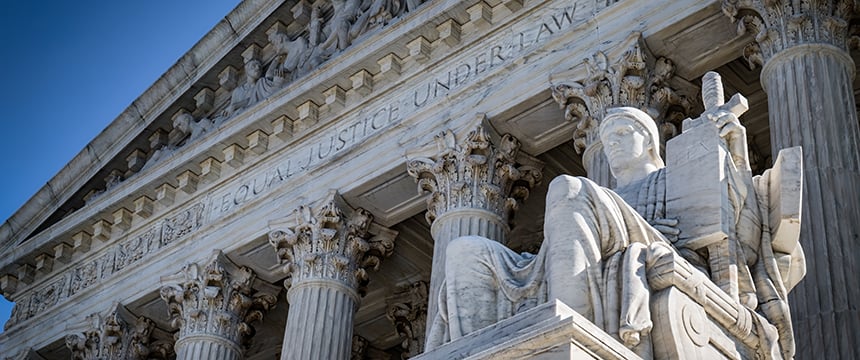Supreme Court hears Arguments on Case Poised to Alter Employers’ Religious Accommodation Obligations

On April 18, 2023, the U.S. Supreme Court heard arguments in a high-profile case seeking to alter employers’ obligations to accommodate workers’ religious observances. Federal law currently requires covered employers to reasonably accommodate employees’ sincerely held religious beliefs — unless doing so would create an “undue hardship” for the employer. Examples of religious accommodations include allowing time off on religious holidays, permitting employees to wear religious dress, or designating a place for employees to pray at work. And in the COVID-19 era, we have discussed vaccine exemptions as another possible religious accommodation at work.
The case recently heard before the Supreme Court, Groff v. Dejoy, may alter the current standard for what constitutes an “undue hardship” for an employer in this context.
Religious Accommodation Case Background
Almost a half-century ago, the Supreme Court stated that an “undue hardship” need not be more than a de minimus amount (i.e., small amount) in order for an employer to lawfully refuse such an accommodation. Over the years, parties such as the Employment Opportunity Commission (EEOC) have pushed for exceptions or adjustments to this standard. With the Groff case, the Supreme Court has the opportunity to modify the long-standing requirement that an undue hardship need only be de minimus.
In the current case, Groff, a former postal worker, sued the United States Postal Service for religious discrimination. An Evangelical Christian, Groff argued that his former employer discriminated against him when it refused to allow him to take Sundays off. According to Groff, his sincerely held religious beliefs require him to take a weekly Sabbath day off of work.
In the lower courts, Mr. Groff lost twice. First, a federal district judge rejected Groff’s argument that the Postal Service’s failure to accommodate his request constituted religious discrimination. Then, Groff appealed to the Third Circuit, which upheld the district court’s decision. The Third Circuit found that allowing Groff Sundays off would constitute an undue hardship on coworkers who would need to work extra shifts. Therefore, the Postal Service did not have to accommodate Groff’s request.
Religious Discrimination Issues Before the Supreme Court
The case presents two issues for the Supreme Court to decide. First, the Court must decide whether the “more-than-de minimus” test for undue hardship is appropriate. Next, the Court must decide whether an employer can demonstrate “undue hardship” with evidence of a burden on employee’s coworkers, rather than hardship on the employer’s business itself. How the Court decides these questions will determine whether employers must change their religious accommodations policies in order to comply with federal law.
Supreme Court’s Reaction to the Case
In the arguments before the Court, the Justices made several comments and questions while weighing each side’s argument. For example, Justice Alito suggested that it would not cost the Postal Service that much money to hire another worker to cover Sundays. Justices Kagan and Sotomayor stressed the resulting burden on other employees if Groff were permitted Sundays off.
Justice Barrett asked Groff’s attorney to give an example of the effect on coworkers if Groff’s request were granted. The lawyer mentioned that other coworkers could quit. Justice Jackson said that the circumstances of each case matter when determining undue hardship. Perhaps most telling, Justice Gorsuch stated that some courts have taken the “de minimus” language too far, and stated that “that’s wrong and we all agree that’s wrong.”
Employers Should Be Aware of Potential Change to Religious Accommodation Law
Employers subject to Title VII should stay alert to the Supreme Court’s upcoming decision in this case. Depending on how the Court decides, employers’ policies and practices regarding religious accommodation requests may need to be adjusted for continued legal compliance. We will keep you posted.




